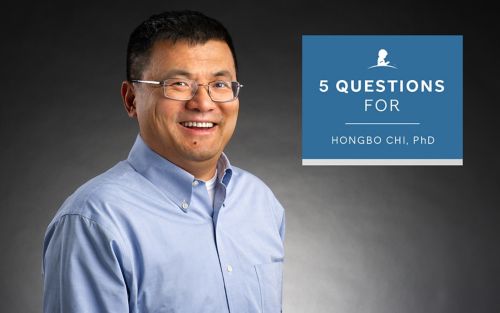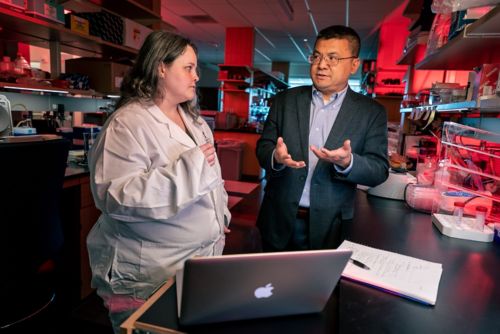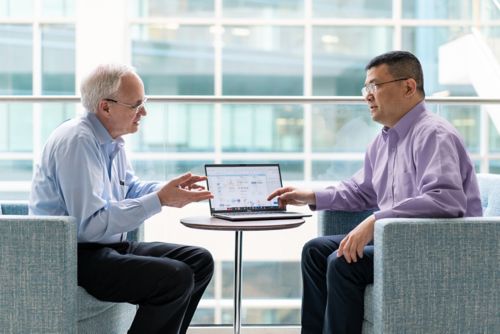St. Jude Family of Websites
Explore our cutting edge research, world-class patient care, career opportunities and more.
St. Jude Children's Research Hospital Home

- Fundraising
St. Jude Family of Websites
Explore our cutting edge research, world-class patient care, career opportunities and more.
St. Jude Children's Research Hospital Home

- Fundraising
5 Questions for Hongbo Chi, PhD

Hongbo Chi, PhD, St. Jude Department of Immunology is working to better understand immunometabolism.
This question-and-answer series explores the motivations, inspirations and accomplishments of St. Jude investigators. Hongbo Chi, PhD, is a member of the St. Jude Department of Immunology, studying immunometabolism and system immunology. Chi is recognized as one of the most highly cited scientists in the world and was recently named a 2023 fellow of the American Association for the Advancement of Science.
1. Why did you decide to become a scientist, and what questions intrigued you during your training?
Growing up, I was always fascinated with trying to figure out how life in nature works. I had a variety of animals as pets and grew flowers and other plants. This fascination was the main reason I studied life science in college (microbiology) and graduate school (pathology). However, I was unsure what subject I wanted to focus on, and it was not until I started graduate coursework that I became really interested in immunology. When I did my graduate studies at the University of Rochester, two courses, namely signal transduction and immunology, captured my great interest and helped me decide to pursue molecular immunology, specifically immune signaling pathways in T-cell biology and adaptive immunity, for postdoctoral training at Yale. I have carried that interest to this day, which evolved to encompass immunometabolism and systems immunology. At the most fundamental level, my main interest is to figure out how the immune system works and how we can harness the power of the immune system for therapeutic benefits. Because the immune system has a powerful impact on human health, by studying the signaling pathways and metabolic processes that mediate immune responses, we gain new insights into biology and disease therapy.
2. What is the importance of mentorship both for you when you were training as a scientist and now as you serve as a mentor to members of your laboratory?
Mentoring and supporting the next generation of scientists is pivotal to science and the community. I was very fortunate to have many amazing mentors who have guided me at every step of my career. From my PhD advisor, Dr. Paul Reynolds, I learned the fundamentals of experimental biology, especially how to do rigorous science and writing. I learned from my postdoctoral mentor, Dr. Richard Flavell, how to ask big scientific questions, how to build the infrastructure (e.g., making knockout mice) to support such endeavors, and how to be positive and create a supportive environment to facilitate scientific advances. So, when I became a principal investigator (PI), I strived to emulate my former mentors by building a lab culture that truly values scientific rigor (“quality always comes first”), work ethics (working hard and being persistent) and a supportive lab environment as a community. Through rigorous training, many of my former postdoctoral trainees have become independent faculty members or other leading positions (in the past three years alone, eight of them have become PIs), and they are all doing impactful research in immunology or related areas. I am also proud that we introduced research and career opportunities to undergraduate and graduate students throughout the years. My interactions with the lab, including both former and current lab members, greatly motivate and inspire me, so I genuinely believe that mentor-mentee relationships are mutually beneficial.

Nichole Chapman, PhD, and Hongbo Chi, PhD, discuss their work in the lab.
3. What do you wish you could tell your younger self about your career in science? Is there any advice you’d give to early-career investigators considering a career in immunology?
I wish to tell my younger self to be bold in science by asking bigger questions, to be more aggressive in applying new technologies and to embrace interdisciplinary collaboration, which opened my eyes to learn about immunology research while in graduate school. As a PI, I have greatly benefited from the integrative culture of St. Jude, which promotes highly collaborative research. I have learned so much about big biological questions and new technologies from many of our wonderful collaborators, both within and outside immunology.
As immunology holds the key to understanding and curing a broad spectrum of human diseases, exemplified by the success of vaccines for infectious diseases and immunotherapies for cancer, it will undoubtedly continue to be a truly impactful research field. Recent technological advances provide unprecedented opportunities for the immunology field to move into the next generation and produce new breakthroughs. For instance, CRISPR technology enables unbiased discovery of functionally relevant immune drivers and disease targets via pooled genetic screening and can allow one to test the function of thousands of genes or the entire genome; the throughput for genetic perturbations with CRISPR–based screens is three or more orders of magnitude greater than the knockout mouse approach. Similarly, compared with traditional flow cytometry, single-cell RNA-sequencing (scRNA-seq) and other omics approaches provide much greater throughput and resolution for unbiased discovery. In sharp contrast, I was only able to analyze three or four preselected markers using flow cytometry during my training period. So, I believe unbiased discovery, especially via the synthesis of experimental biology and cutting-edge technologies, is key to future immunology research, and it will be important for young immunologists to embrace technological advances and push immunology research forward.
4. Your work focuses on immunometabolism — what is that? What questions are you trying to answer through your research?
Metabolism is the core process underlying essentially all biological functions. Immunometabolism aims to discover the mechanisms linking the metabolic state of immune cells (e.g., how immune cells utilize nutrients such as glucose and amino acids to build energy and biomass) with tissue homeostasis and immunity and to use these insights to develop better treatments for immune-mediated disorders. We approach these questions by integrating hypothesis-driven and systems immunology approaches, and our work has produced innovations and impacts, for example, by establishing the principle of metabolic reprogramming for T-cell fate and state and mechanisms of nutrient and mTOR signaling. Moreover, our systems immunology approaches, especially pooled in vivo CRISPR functional screens and multi-omics strategies, enable the discovery of novel immuno-metabolic processes and disease targets with a clear path to clinical translation. Our present research will address three fundamental questions in immunometabolism and adaptive immunity:
- How do metabolic processes and causal networks program T-cell fate? The goal is to determine the fundamental mechanisms for the metabolic reprogramming of immune responses and the interplay with the traditional immune pathways.
- How are nutrient signals sensed and communicated in tissue immunity? The goal is to determine how nutrients and metabolites mediate metabolic communication between T cells and tumor cells or other immune cells, and the signaling mechanisms.
- Can we target metabolic vulnerability in cancer and immunity? Efforts are underway to engineer next-generation CAR T cells (e.g., by editing the REGNASE-1 gene) for clinical translation to treat patients with pediatric cancers.
Overall, the systems immunology strategies provide functionally relevant discovery platforms to support future research to understand metabolic reprogramming, communication and vulnerability.

Stephen Gottschalk, MD, Department of Bone Marrow Transplantation & Cellular Therapy chair, discusses a project with Hongbo Chi, PhD, Department of Immunology.
5. Where do you draw inspiration as an investigator when encountering obstacles or challenges requiring creative solutions?
When facing obstacles or challenges, I draw inspiration from both the vast opportunities of modern scientific research and the inspiring people from my previous experiences or the present time. I recognize the challenges in pursuing innovative research, as many (or perhaps most) of our hypotheses could be wrong. In those cases, I try to take a step back and take an alternative, and many times, a more unbiased approach as described above, to tackle the question. I also think of many positive experiences working with amazing mentors and inspiring scientists; sometimes, I would ask myself “what would Richard (my postdoctoral mentor) do?” We are fortunate to have many more tools at our disposal today compared to 20 years ago. If we ask meaningful questions and apply rigorous approaches, the discovery process is fun; even with obstacles and challenges, we can still learn from the process or our own surprising findings.
Moreover, I draw inspiration from people around me, including my lab members, colleagues and collaborators, as well as the patients and families of St. Jude who are at the heart of the institution. I still remember the many brainstorming sessions I had with the lab, trying to figure out solutions to the problems we faced. I also vividly remember my interview day at St. Jude 18 years ago, when I realized how our research could be impactful for children with catastrophic diseases. By focusing on fundamental questions in immunology and how we can translate them into new immunotherapies, I consider the science in immunology and the people around me in the institution to be truly inspiring.







